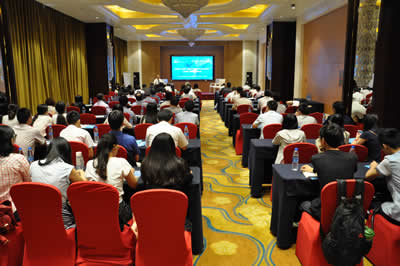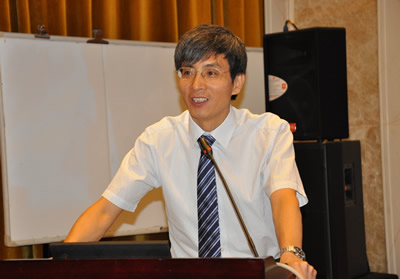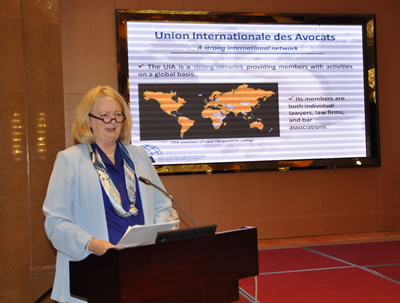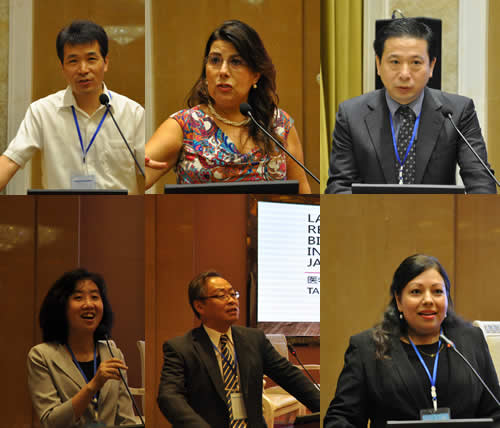During 1st and 2nd September, the 2016 UIA Biotechnology Law Seminar was held in USTC. The seminar was organized by USTC and co-organized by the School of Public Affairs (PAS).
There were more than 120 participants including CHEN Chusheng, Vice President of USTC; DUAN Ruichun, President of China Law Association on Science and Technology (CLAST); LIU Dong, Vice Director of Anhui Intellectual Property Office; Barbara J. Gilason, President of UIA Biotechnology Law Commission; UIA members, university researchers, judges, lawyers, government officials, medical professionals from around the world and students of PAS. The host of the seminar was SONG Wei, Dean of PAS.

Vice President CHEN Chusheng delivered a welcome speech on behalf of USTC. He greeted participants from home and abroad, and then introduced USTC’s history and its prominent achievements in S&T innovation. Vice President CHEN expressed his hopes that a comprehensive discussion on legislation related to biotechnology can be realized during the seminar in order to better pursue theoretical and practical progress in the field. He also shared his sincere wishes for the successful operations of the seminar.

President DUAN Ruichun gave a welcome speech on behalf of CLAST. He talked about the new challenges of current biotechnology legislation, execution and judicature issues. He detailed development and cooperation of China’s sci-tech legal system and hoped for further cooperation with UIA. President DUAN also expressed his gratitude to USTC and PAS for a well organized event.
The Bureau of International Co-operation, Chinese Academy of Sciences sent greetings to wish for a successful seminar. The Bureau also extended a warm welcome to all participants in the UIA Biotechnology Law Commission’s first international conference in China, it also voiced its expectations to build a platform to enhance international cooperation on biotechnology laws.
President Barbara J. Gilason firstly thanked all seminar participants for their concern and support, then expressed special thanks to PAS for all efforts in the seminar. She presented a speech titled Union Internationale des Avocats: UIA to illustrate its progress, organizational structure, vision and mission, achievements, impact etc. Her presentation stressed the importance of biotechnology to people’s health, to society and economic development. She pointed out that UIA is the world largest lawyer organization of sci-tech law and intellectual property (IP), it is a vital platform of worldwide sci-tech and the IP field. President Gilason hoped that more outstanding professionals would join UIA in order to boost interaction between sci-tech and law.

The theme of this seminar was Homology of Medicine and Food: New Legislation and New Policy in the Era of Genes, with different panels on licensing and technology transfer of Chinese traditional medicine, biotech and IP, debate and legislation of genetic engineering, food safety and GMO (Genetically Modified Organisms), laws and policies related to biotechnology industrialization.
A total of 25 speakers impressed the audience with their fantastic presentations. During the Q&A section, participants had an intense discussion about biotechnology laws, theoretical problems, and related judicial practice.

On 2nd September, the seminar was brought to a successful close. At the closing ceremony, Dean SONG and President Barbara J. Gilason respectively addressed the audience.
President Barbara J. Gilason once again thanked PAS for its support in the seminar. She said it was her pleasure to be in Hefei and to have the opportunity to communicate with different professionals. She wished that all participants could benefit from the seminar, and could keep and promote active attitudes and ideas towards learning for the better development of biotechnology law.
The 2016 UIA Biotechnology Law Seminar contained a wide range of topics and was rich in content. It facilitated interaction between professionals from different areas. The seminar also deepened participants’ understanding of a variety of practical cases, broadened PAS students and teachers’ horizons and improved their professionalcompetence.